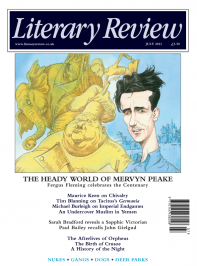Simon Willis
I’ll Take the Low Road
Waterline
By Ross Raisin
Viking 272pp £12.99
Near the beginning of Waterline, Ross Raisin’s second novel, Mick Little dashes around his house in Glasgow collecting up family photographs. His wife Cathy has recently died from cancer; his two sons, Craig and Robbie, are estranged; his job as a cabbie isn’t there for him to go back to. Rifling through the photographs, he looks at the face of his wife – ‘a crowd of Cathys laughing and posing’ – but he can’t relate to it. ‘Even if he stares for minutes at each one, trying to mind what the occasion was, what she’d been saying as the picture was took, it’s no use.’ The same is true of the objects in his house: the rooms of familiar things, put to familiar uses, have become uncanny. Things have fallen apart, and the rest of the novel traces the progress of a man whose life seems irremediably broken.
Cathy’s death has left Mick exposed to pity, gossip, and the rent-chasers from the local authority. Most of all it has left him vulnerable to his own guilt, and the perils of navigating between remembering too much and not remembering enough. His solution is to withdraw from one

Sign Up to our newsletter
Receive free articles, highlights from the archive, news, details of prizes, and much more.@Lit_Review
Follow Literary Review on Twitter
Twitter Feed
How to ruin a film - a short guide by @TWHodgkinson:
Thomas W Hodgkinson - There Was No Sorcerer
Thomas W Hodgkinson: There Was No Sorcerer - Box Office Poison: Hollywood’s Story in a Century of Flops by Tim Robey
literaryreview.co.uk
How to ruin a film - a short guide by @TWHodgkinson:
Thomas W Hodgkinson - There Was No Sorcerer
Thomas W Hodgkinson: There Was No Sorcerer - Box Office Poison: Hollywood’s Story in a Century of Flops by Tim Robey
literaryreview.co.uk
Give the gift that lasts all year with a subscription to Literary Review. Save up to 35% on the cover price when you visit us at https://literaryreview.co.uk/subscribe and enter the code 'XMAS24'